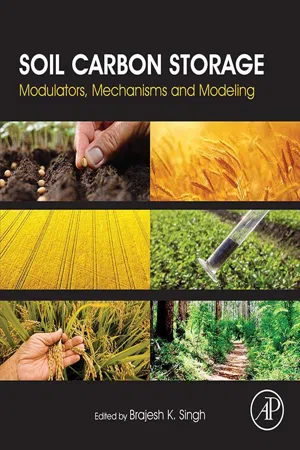
Soil Carbon Storage
Modulators, Mechanisms and Modeling
Brajesh Singh
- 340 pages
- English
- ePUB (mobile friendly)
- Available on iOS & Android
Soil Carbon Storage
Modulators, Mechanisms and Modeling
Brajesh Singh
About This Book
Soil Carbon Storage: Modulators, Mechanisms and Modeling takes a novel approach to the issue of soil carbon storage by considering soil C sequestration as a function of the interaction between biotic (e.g. microbes and plants) and abiotic (climate, soil types, management practices) modulators as a key driver of soil C. These modulators are central to C balance through their processing of C from both plant inputs and native soil organic matter. This book considers this concept in the light of state-of-the-art methodologies that elucidate these interactions and increase our understanding of a vitally important, but poorly characterized component of the global C cycle.
The book provides soil scientists with a comprehensive, mechanistic, quantitative and predictive understanding of soil carbon storage. It presents a new framework that can be included in predictive models and management practices for better prediction and enhanced C storage in soils.
- Identifies management practices to enhance storage of soil C under different agro-ecosystems, soil types and climatic conditions
- Provides novel conceptual frameworks of biotic (especially microbial) and abiotic data to improve prediction of simulation model at plot to global scale
- Advances the conceptual framework needed to support robust predictive models and sustainable land management practices